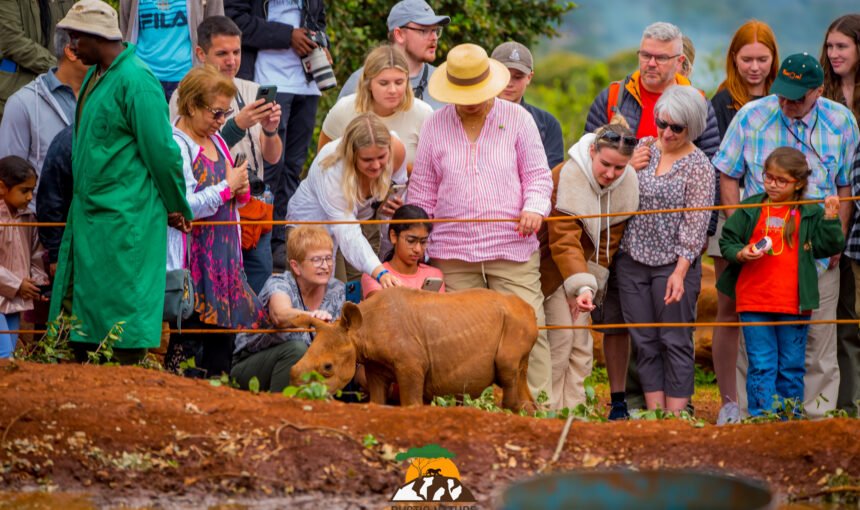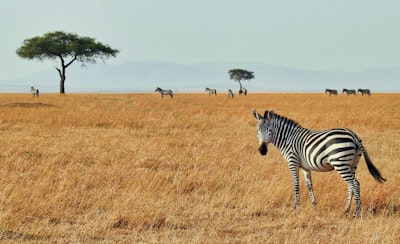The David Sheldrick Elephant Orphanage is a place in Kenya that helps orphaned elephants. It was founded in 1977 by Dr. Dame Daphne Sheldrick and is now run by the Sheldrick Wildlife Trust (SWT). The orphanage is known for its groundbreaking work in saving and caring for elephants.
Importance in Saving Elephants
- Rescuing and Healing: The David Sheldrick Elephant Orphanage has successfully healed over 320 orphaned elephants, giving them another chance at life.
- Protecting Wildlife: In addition to rescuing orphaned elephants, the SWT works to stop poaching, preserve habitats, and provide veterinary care, which is vital for protecting Africa’s wildlife.
What You’ll Find in This Guide
This guide will provide you with valuable information about the David Sheldrick Elephant Orphanage, including:
- Understanding the Orphanage: Insights into its history, mission, and remarkable achievements.
- Getting There: Practical information on location, transportation options, and entry requirements.
- Visitor Experience: A glimpse of what to expect during your visit.
- Adoption Programs: How you can foster an orphaned elephant or rhino.
- Conservation Efforts: Broader conservation strategies by SWT.
- Supporting Wildlife Conservation: Ways to donate and make a difference.
- Staying Connected: Importance of staying informed through social media.
By reading this guide, you’ll learn how you can help protect wildlife while also enjoying the wonders of the David Sheldrick Elephant Orphanage.
1. Understanding the David Sheldrick Elephant Orphanage
The David Sheldrick Elephant Orphanage, part of the Sheldrick Wildlife Trust (SWT), is a place of hope for orphaned elephants and rhinos. It was founded in 1977 by Dr. Dame Daphne Sheldrick to honor her late husband, David Sheldrick, and to continue his important conservation work in Tsavo East National Park.
Mission and Vision
The mission of the Sheldrick Wildlife Trust is:
- Rescue and Rehabilitation: Saving orphaned elephants and rhinos, giving them a chance at life.
- Habitat Preservation: Protecting natural habitats so wildlife can flourish.
- Community Engagement: Educating and involving local communities to promote living in harmony with wildlife.
Achievements Since 1977
Since it started, the SWT has achieved amazing things:
- Over 320 orphaned elephants rescued and rehabilitated: Each elephant is cared for until it can go back to the wild.
- More than 12,000 veterinary cases attended: Quick medical help for injured wildlife ensures their survival.
The trust’s hard work has not only saved many animals but also helped conservation efforts across Africa.
When you go on a David Sheldrick Elephant Orphanage tour, you’ll see firsthand the life-saving work being done every day, making a real difference in wildlife conservation.
2. Getting There: Location and Accessibility
The David Sheldrick Elephant Orphanage is located within the vast Nairobi National Park, offering a unique chance to witness wildlife conservation efforts firsthand. This sanctuary serves as a safe haven for orphaned elephants and rhinos, surrounded by Kenya’s pristine wilderness.
How to Get There
Transportation Options:
- By Car: A quick 30-minute drive from Nairobi’s city center will take you directly to Nairobi National Park.
- Public Transport: Use a taxi or ride-sharing services like Uber for a hassle-free trip.
- Guided Tours: Several local tour operators provide packages that include transportation to and from the orphanage.
Entry Requirements
Advance Booking: To control the number of visitors and ensure an intimate experience, it’s important to book in advance. Reserve your spot by contacting Sheldrick Wildlife Trust throuth their website. You will need to provide details including:
- Date you wish to visit
- Number of adult and child tickets you wish to book
- Name of each adult attending
- Name and age of each child attending
Donation Fee: A donation fee is required for entry, which goes directly towards the care and rehabilitation of the animals.
The minimum donations for entry to the Nursery are:
- Adult, aged 12 years and above: US$20 per person, or the equivalent in Kenya Shillings (based on the day’s rate).
- Adult, Kenya resident: Ksh 2,000, with proof of residency.
- Child: aged under 12 years, US$5 per person, or the equivalent in Kenya Shillings (based on the day’s rate).
- Child: Kenya resident, Ksh 500, with proof of residency.
Your entry donation is not pre-paid, but payable in cash upon entry to the SWT Nursery on the day of your booked visit.
Park Fees: There is an additional fee for entering Nairobi National Park:
- You can pay this fee through the eCitizen portal, making your visit smooth and convenient.
| Citizen AdultsKSH | Citizen ChildKSH | Resident AdultsKSH | Resident ChildKSH | Non-Resident AdultsUSD | Non-Resident ChildUSD |
| 430 | 215 | 430 | 215 | 43 | 22 |
Visiting hours at the orphanage are strictly from 11 am to 12 pm, during which you can observe feeding time and daily care routines of these gentle giants.
Get ready for an unforgettable experience that not only educates but also inspires you to support important conservation efforts.
3. Experience the Magic: What to Expect During Your Visit
Visiting the David Sheldrick Elephant Orphanage offers an unparalleled opportunity to immerse yourself in the world of elephant conservation. The nursery opens its doors to visitors from 11 am to 12 pm daily, except on December 25th. This one-hour window is packed with activities that capture the essence of elephant care and rehabilitation.
Daily Tours and Activities
During your visit, you will witness the elephant feeding session, a highlight of the nursery experience. Keepers bring out the orphaned elephants, who eagerly drink their milk formula from oversized bottles. These moments are not only heartwarming but also educational as keepers share stories about each elephant’s rescue and journey towards rehabilitation.
Observing the care routines for these gentle giants adds another layer to your experience. You’ll see how the keepers interact with the elephants, engaging them in playful activities and ensuring they receive adequate socialization. This interaction is crucial for their development and eventual reintegration into the wild.
Expect to learn about:
- The individualized care plans tailored for each orphan.
- The importance of mud baths for skin care and temperature regulation.
- The role of enrichment activities in promoting natural behaviors.
Visitors leave with a deeper understanding of the dedication involved in wildlife conservation, making every minute spent at the David Sheldrick Elephant Orphanage truly magical.
4. Make a Difference: Adoption Programs at the Orphanage
When you adopt an elephant or rhino through the Sheldrick Wildlife Trust, you become an essential part of their journey toward rehabilitation and eventual reintegration into the wild. The process is simple yet profoundly impactful:
- Choose Your Orphan: Visit the SWT website to explore profiles of orphaned elephants and rhinos. Each profile includes personal histories, photographs, and videos.
- Adopt or Foster: Decide whether to adopt or foster your chosen orphan. Adoption can be done on an annual basis with a minimum donation that supports their care.
- Receive Regular Updates: As a foster parent, you’ll receive monthly updates about your adopted animal’s progress, including heartwarming stories and milestones.
- Access Keepers’ Diaries: Gain exclusive access to the Keepers’ Diaries, which provide daily insights into the lives of all the orphans under SWT’s care.
Adopting an orphan not only provides critical funding for their care but also connects you deeply with wildlife conservation efforts. Regular updates and diary entries ensure you’re always informed about how your support makes a tangible difference.
Through adoption programs, individuals worldwide can engage directly with wildlife conservation, making it possible for these magnificent creatures to thrive once again in their natural habitats.
5. Beyond Orphan Care: Conservation Efforts by SWT
Broader Conservation Strategies
The Sheldrick Wildlife Trust (SWT) extends its dedication to wildlife conservation far beyond the orphanage. The trust implements a multi-faceted approach that includes:
- Anti-poaching Initiatives: SWT operates aerial surveillance and anti-poaching teams equipped to combat illegal activities threatening wildlife.
- Veterinary Assistance: They provide critical veterinary assistance, treating over 12,000 cases involving injured or ill animals.
- Habitat Preservation: Efforts are directed towards the preservation and restoration of natural habitats essential for wildlife survival.
Engaging Local Communities
Community awareness plays a crucial role in SWT’s strategy. By educating local communities on the importance of wildlife conservation, they work to foster a coexistence between humans and animals.
- Human-Wildlife Conflict Mitigation: Programs designed to address and reduce conflicts between local populations and wildlife help secure a safer environment for both.
- Sustainable Livelihoods: SWT supports alternative livelihoods for communities living near wildlife areas, reducing reliance on poaching and habitat destruction.
The trust’s initiatives reflect an integrated effort to protect Africa’s natural heritage, ensuring a future where both wildlife and human communities thrive.
6. Your Impact Matters: How Donations Support Wildlife Conservation
Donations play a crucial role in supporting the Sheldrick Wildlife Trust (SWT) and its extensive conservation efforts. By contributing, you help ensure the continued success of initiatives like orphan elephant rescue, veterinary care, anti-poaching measures, and habitat preservation.
Donation Options
There are multiple ways to make charitable contributions to support the David Sheldrick Elephant Orphanage:
- One-Time Donations: Ideal for those who wish to make a single impactful contribution. These funds support immediate needs such as medical supplies, food, and operational costs.
- Recurring Donations: For ongoing support, consider a monthly or annual donation. Recurring donations provide a steady stream of resources that enable long-term planning and sustained conservation activities.
- Special Campaigns: Engaging in seasonal giving initiatives like the Season of Giving, can amplify your impact during specific times of the year.
How Your Contributions Help
Contributions directly support:
- Rescue Operations: Funding critical missions to save orphaned elephants and rhinos from dire situations.
- Rehabilitation Programs: Ensuring rescued animals receive the care they need to thrive and eventually reintegrate into the wild.
- Veterinary Services: Providing essential medical treatment for injured wildlife across Kenya.
- Anti-Poaching Efforts: Equipping rangers and supporting patrols to protect wildlife from illegal activities.
- Community Outreach: Engaging local communities in conservation education to foster coexistence between humans and wildlife.
“Every donation, no matter the size, makes a significant difference in our fight to protect Africa’s wildlife,” says Angela Sheldrick, CEO of SWT.
Supporting SWT not only helps individual animals but also contributes to broader ecological conservation. Additionally, exploring options like grant programs can further enhance your contribution towards wildlife conservation efforts.
7. Stay Connected with SWT
Staying connected with the Sheldrick Wildlife Trust (SWT) allows you to immerse yourself in the ongoing journey of elephant conservation. Utilizing various digital platforms, SWT keeps supporters informed and engaged through:
- Social Media Updates: Follow SWT on platforms like Facebook, Instagram, and Twitter to receive real-time updates. Witness daily snippets of orphaned elephants’ lives, from playful interactions to crucial rehabilitation milestones.
- Keepers’ Diaries: Delve deeper into the lives of the orphans by accessing the Keepers’ Diaries. These detailed entries provide personal insights from the dedicated keepers who care for the elephants, offering a unique perspective on each animal’s progress and personality.
- Monthly Newsletters: Subscribe to SWT’s monthly newsletters for comprehensive updates. These newsletters cover a broad spectrum of topics including recent rescues, conservation efforts, and upcoming events. They serve as an informative resource to stay abreast of SWT’s multifaceted initiatives.
Being part of these online communities not only enhances your understanding of wildlife conservation but also fosters a sense of connection with the incredible work being done at SWT. Engaging with these resources ensures you remain an active participant in their mission to protect and preserve Africa’s wildlife.
Conclusion: Join Us in Protecting Elephants!
Supporting wildlife conservation is not just a noble act; it’s necessary for preserving our planet’s biodiversity. When you choose to visit David Sheldrick Elephant Orphanage, you not only see the amazing work being done but also directly help in the survival and rehabilitation of these magnificent animals.
Make a difference today:
- Visit the Orphanage: Experience firsthand the dedication and care given to orphaned elephants.
- Adopt an Elephant: Provide ongoing support through adoption programs.
- Donate: Every contribution, whether one-time or recurring, plays a crucial role in their conservation efforts.
Together, we can ensure that future generations continue to enjoy and marvel at Africa’s wildlife. Join us in this critical mission at the David Sheldrick Elephant Orphanage.
FAQs (Frequently Asked Questions)
What is the David Sheldrick Elephant Orphanage?
The David Sheldrick Elephant Orphanage is a renowned facility dedicated to the rescue and rehabilitation of orphaned elephants. Established by Dr. Dame Daphne Sheldrick, it plays a significant role in elephant conservation and wildlife protection.
How can I visit the David Sheldrick Elephant Orphanage?
The orphanage is located within Nairobi National Park. Visitors can access it via various transportation options. It is essential to book in advance and pay an entry fee, which can be done through the Ecitizen portal.
What can I expect during my visit to the orphanage?
Visitors can experience daily tours from 11 am to 12 pm, where they can observe feeding times and care routines for the elephants. Please note that the orphanage is closed on December 25th.
Are there adoption programs available at the orphanage?
Yes, the David Sheldrick Elephant Orphanage offers adoption and fostering programs for orphaned elephants and rhinos. Benefits include monthly updates and access to Keepers’ Diaries, allowing adopters to stay connected with their chosen animals.
What conservation efforts does the Sheldrick Wildlife Trust engage in beyond orphan care?
Beyond caring for orphans, SWT implements broader conservation strategies that include community awareness initiatives, anti-poaching efforts, and habitat preservation. They actively engage with local communities to help mitigate human-wildlife conflict.
How can I support the David Sheldrick Elephant Orphanage through donations?
There are various ways to donate to the Sheldrick Wildlife Trust, including one-time contributions or recurring donations. Every donation helps support wildlife conservation efforts and the ongoing work of the orphanage.





